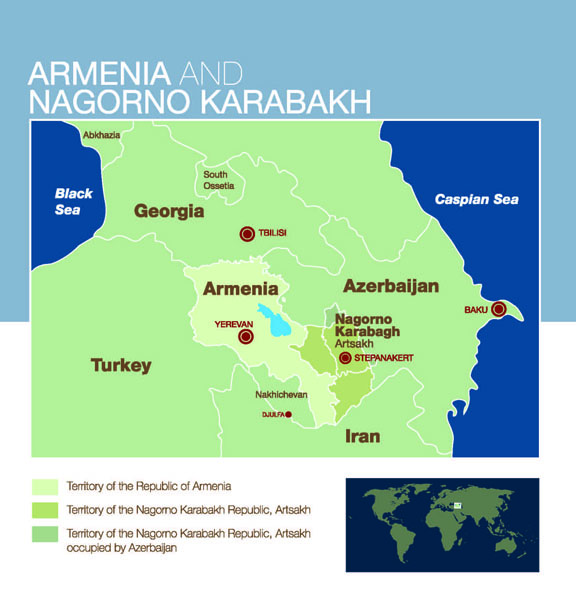ANCA: U.S. Policy on Karabakh Should Align with American Values
Armenia and Artsakh
WASHINGTON—As U.S. Ambassador James Warlick gears up to make a statement on Nagorno Karabakh Wednesday, the Armenian National Committee of America Executive Director Aram Hamparian underscored the importance of aligning U.S. policy with American values.
“The standard against which we measure our State Department’s policy on Nagorno Karabakh is, of course, America’s core commitment to the universal values of freedom and democracy,” said Hamparian. “Since the era in which we won our own independence, Americans have stood proudly on the side of liberty, rejecting foreign rule over free peoples, and defending – for ourselves and all humankind – the enduring principle that governments must derive their just powers from the consent of the governed.”
Ambassador Warlick, who serves as Co-Chair of the Organization for Security and Cooperation in Europe (OSCE) Minsk Group, which is mediating status and security issues related to Nagorno Karabakh, is set to issue the U.S. policy statement at 9:00 am EST on May 7th, at a Carnegie Endowment for International Peace roundtable. The statement is timed with the 20th anniversary of the 1994 Nagorno Karabakh ceasefire.
“The Republic of Nagorno Karabakh’s independence, like our own, represents the victory of democratic self-determination over foreign tyranny and aggression. We rightfully celebrate and support this great triumph of the human spirit,” noted Hamparian. “As Americans, we should never ask others to live with less freedom than we would accept for ourselves.”
The Republic of Nagorno Karabakh (Artsakh) is an integral part of historic Armenia that was arbitrarily carved out in 1921 by Joseph Stalin and placed under Soviet Azerbaijani administration, but with autonomous status, as part of the Soviet Union’s divide-and-conquer strategy in the Caucasus. Nagorno Karabakh has never been part of an independent Azerbaijani state.
During seven decades of Soviet Azerbaijani rule, the Armenian population of Nagorno Karabakh was subjected to discriminatory policies aimed at its removal. Even after these efforts to force Armenians from their land, Nagorno Karabakh’s pre-war population in 1988 was over 80% Armenian. In the late 1980’s, the United States welcomed Nagorno Karabakh’s historic challenge to the Soviet system and its leadership in sparking democratic movements in the Baltics and throughout the Soviet empire. Following a peaceful demand by Artsakh’s legislative body to reunite the region with Armenia in 1988, Azerbaijan launched an ethnic cleansing campaign against individuals of Armenian descent with pogroms against civilians in several towns, including Sumgait and Baku.
On September 2, 1991, the people of Nagorno Karabakh declared independence from the Soviet Union and became the Nagorno Karabakh Republic. On December 10, 1991, Nagorno Karabakh held an independence referendum in which 82% of all voters participated and 99% voted for independence. In response, Azerbaijan launched an all-out war against the Nagorno Karabakh Republic, targeting civilians and recruiting Islamic extremist mujahideen from Afghanistan and Chechnya to join the Azerbaijani army against Christian Armenians. A ceasefire was signed on May 12, 1994.
Since declaring independence in 1991, Nagorno Karabakh has successfully conducted five parliamentary and five presidential elections – that have been praised by international observers as free, fair and transparent. The most recent presidential elections held in July 2012 were favorably received by more than 80 international observers from two dozen countries, including the United States. Election observers included the former Rhode Island Attorney General Patrick Lynch and then Canadian Parliamentarian Jim Karygianni, who declared, “It was a picture perfect election from start to finish.” Freedom House upgraded Karabakh’s democracy status as a result in 2012. Parliamentary elections held in May 2010 were rated “free, fair and transparent” by an independent American-Dutch monitoring delegation sponsored by the Public International Law and Policy Group (PILPG), which noted that Karabakh “continues to make strong progress in establishing and sustaining a healthy and sustainable democracy.”

